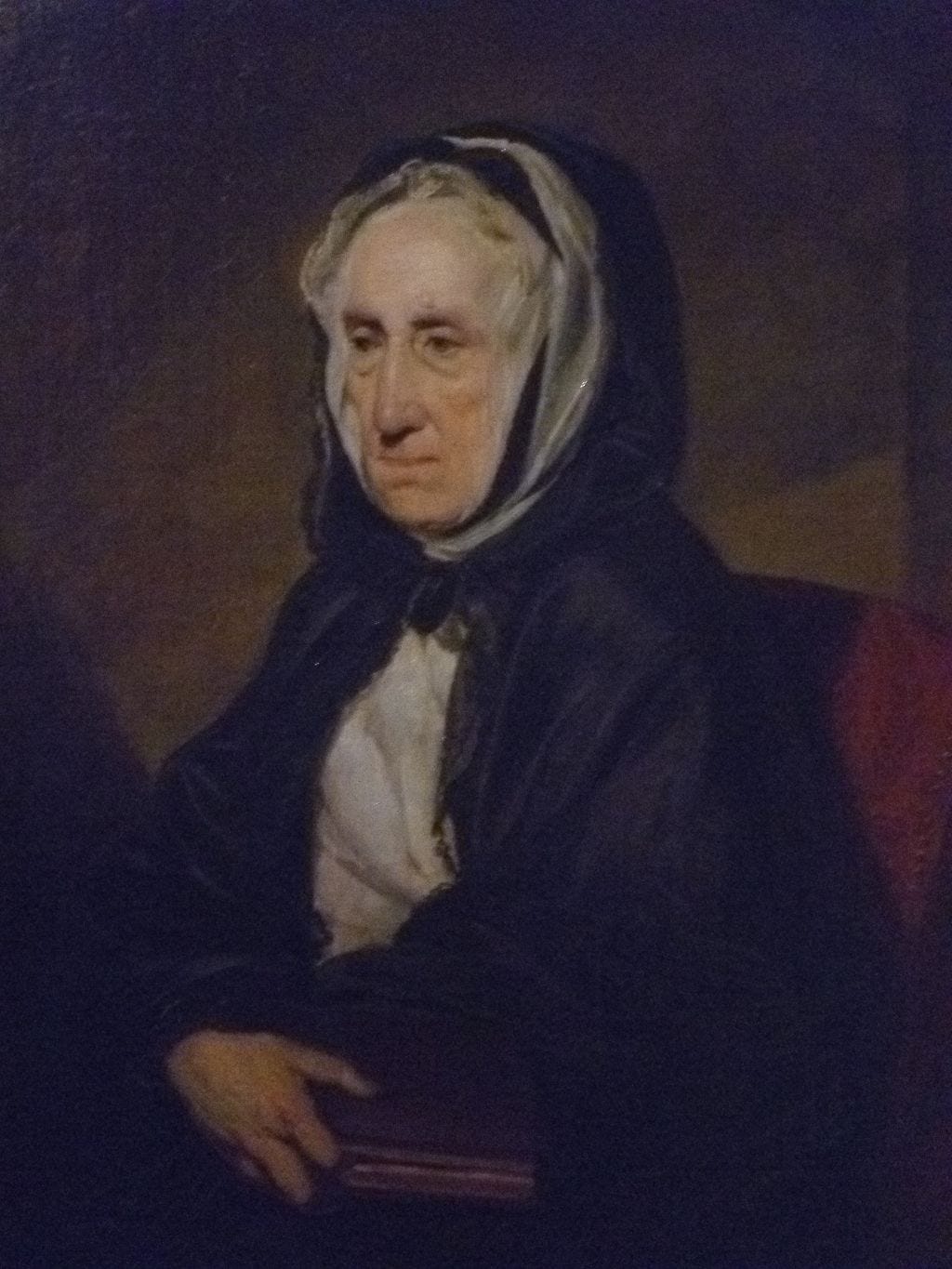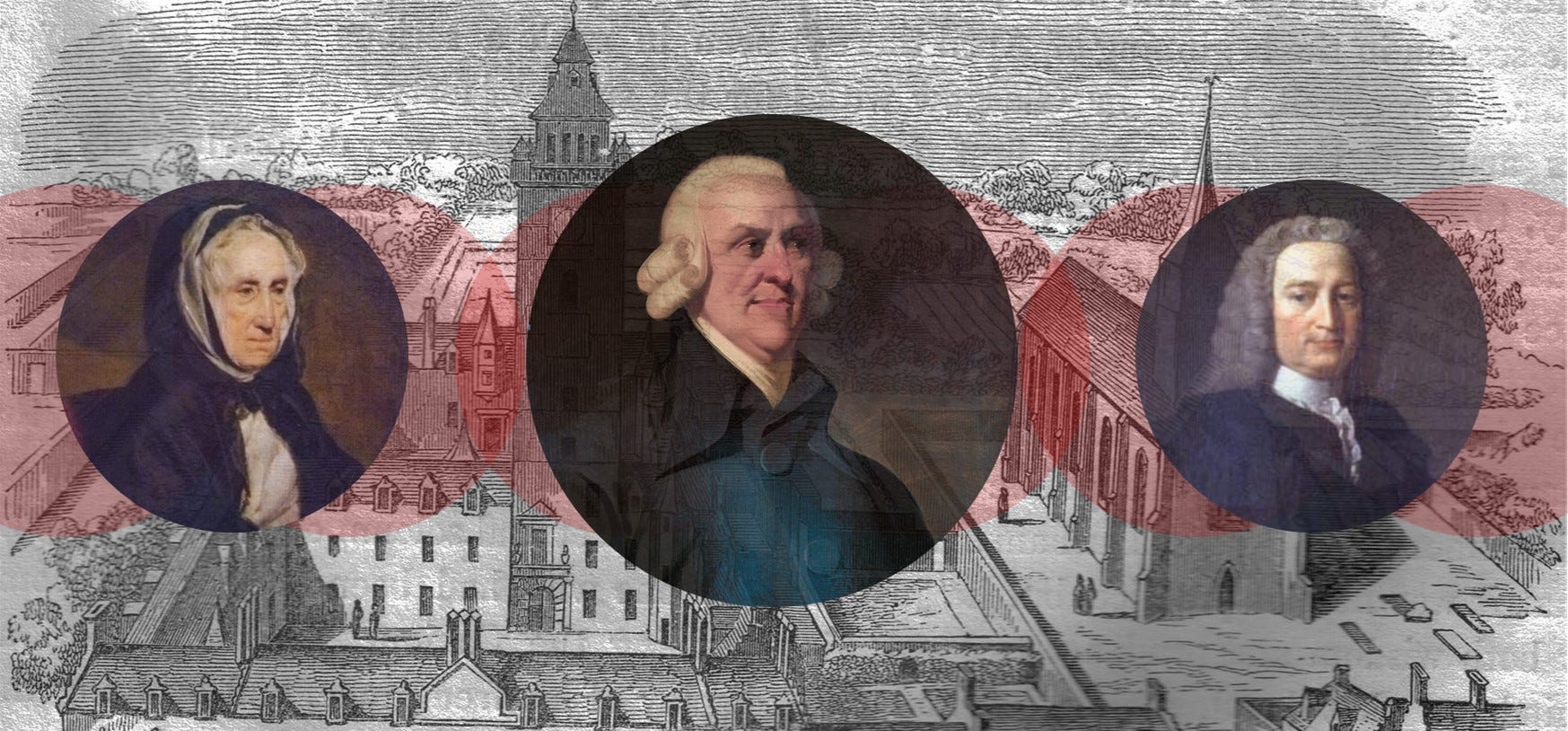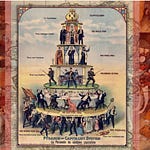Hello Interactors,
Last week’s post on Karl Marx introduced issues he had with the Scottish philosopher and so-called father of economics, Adam Smith. I found myself digging into Smith’s life and work before his contributions to economics. Which, as history shows, was barely recognized until 1942. His name is now more popular than ever.
As interactors, you’re special individuals self-selected to be a part of an evolutionary journey. You’re also members of an attentive community so I welcome your participation.
Please leave your comments below or email me directly.
Now let’s go…
MAKING SENSE OF THE SENSES
Visiting his grandfather in Strathenry, the four-year boy wandered to the banks of the River Leven. He was a weak boy, shy, and prone to talking to himself. He’d lost his father three months before he was born and was being raised by his mother, whom he adored, alone.
When the boy did not return to his grandfather’s home, he and his mother went looking. Surely in a panic assuming the worst, they soon encountered a man who had just witnessed something suspicious. He had come across a group of nomadic people heading toward a nearby town that included a woman struggling to hold onto a screaming child.
A search crew was dispatched immediately. And there, in the town of Leslie, nearly a mile from Strathenry, the woman was spotted with the boy. As the crew approached the woman, she dropped the screaming child who ran to his saviors. The crew then returned the boy to his mother. He never left her side again. He did, however, like keeping to himself until the day he died. And he never stopped talking to himself either. It’s hard to know if he was traumatized by that event, but it didn’t stop him from becoming one of Scotland’s most famous academics. Had that group of nomads managed to kidnap that young boy, the founding father of economics would not have been Adam Smith.

Smith was born in 1723, entered school in at age six, and began learning Latin as early as 1733, age ten. He was sent to one of the best secondary schools in Scotland, the Burgh School in Kirkcaldy. Kirkcaldy was a port town with a population of 1500 people. Though Smith was shy and kept to himself, he was nonetheless engaged and observant. He kept track of the town’s activities and was familiar with some of its local characters. The town was home to shippers and traders and thus full of tall tales from journey men and smugglers.1

It also had multiple nail manufacturers that young Adam liked to visit. It was there and then he was first exposed to division of labor and how the value of labor was compensated. Nailers, he observed, were paid in nails which they would then exchange for other goods at local stores. Perhaps these observations, and his high marks in mathematics and classics, were the first seeds to grow as he entered the University of Glasgow in 1737 at the ripe age of 14.
Smith continued his studies in mathematics and Latin but added Greek and Moral Philosophy. This was the glimmering beginnings of the enlightenment and he himself was about to be enlightened. His math professor was Robert Simson, an eccentric man made famous through Europe as the “Restorer of Grecian Geometry”, as his tombstone reads. The Simson line in geometry is named after him and he also noted a curious relationship among Fibonacci numbers. As the values increase, the ratio of adjacent numbers approaches the golden ratio of 1.6180... But his most influential professor was Thomas Hutcheson, his Moral Philosophy instructor – a discipline Smith went on to become famous for himself.

But when Smith was in school, Hutcheson was the popular one in Britain. He was one of Britain’s premiere moralists and key figure in a long line of Scottish Enlightenment thinkers, including his professor, Thomas Locke. He was also the first professor in Glasgow to lecture in the native tongue of his students and not in Latin. This alone made him an easy target among conservative faculty, but it was what he was teaching that really rattled them.

Hutcheson believed, contrary to the established and prevailing belief, human action does not descend from the will of God, but from one’s own mind. And even then, we have little to no control over our own actions but are instead influenced by our complex interactions with people and place.
He believed we form images and beliefs in our mind by sensing the environment around us through our five physical senses. We then formulate ideas which lead to feelings either pleasure or pain. This, in turn, leads to the creation of other senses internal to our mind – though still interrelated and interdependent on our five external senses. He believed there are many mental senses generated, but three emerged as particularly notable – especially as we learn more of Adam Smith’s own philosophies.
The first is a public sense for the happiness of others and the pleasure it brings, but also the sadness that comes with observing misery in others. The second is the moral sense upon reflection of our own good or evil, and perceived good or evil in others, and the feelings of pleasure or pain that ensue. And the third is a sense of honor that comes from the admiration from others who observe the good in us for the positive actions we may have taken – the very actions of which are necessary for sensing the pleasure that comes when seeing others are happy.2
Hutcheson observed these emotions are not willed. We cannot will ourselves into happiness, but we can will ourselves to take actions that create public conditions that enable feelings of pleasure to arise. These pleasurable feelings arise, as a moral sense, out of complex interactions among others, to instill a public sense of pleasure, which upon reflection of our own behavior instills pleasure in us as a sense of honor. Good behavior toward ourselves and toward others makes us and others feel good. We are all then rewarded with a sense of honor which in turn motivates more good behavior.
A SENTIMENTAL MOOD FROM A PRUDE DUDE
Hutcheson’s ideas shock the religious establishment who believed goodness can only come through getting in the good graces with God through worship. One 19th-century biographer noted Hutcheson was “bitterly attacked by the older generation outside the walls of the College as a ‘new light’ fraught with dangers to all accepted beliefs, and at the same time worshipped like an idol by the younger generation inside the walls, who were thankful for the light he brought them, and had no quarrel with it for being new.”
His views were also in opposition to another influential philosophical figure during these times, Thomas Hobbes, who believed our will to act was rooted not in altruism, but in selfishness and egoism. Though Hutcheson admitted there is virtue in tempered self-love, taken to an extreme could erode not only one’s moral sense, but also public sense and a reciprocal sense of honor. Clearly, Hobbesian beliefs made their way into colonial America and are present in cultural norms and beliefs today, especially in the neoliberal tradition that helped pull Smith, and the single occurrence of the words ‘invisible hand’, from obscurity.
But many of Hutcheson’s teachings also made their way to colonial America. His book, Inquiry into the Original of Our Ideas of Beauty and Virtue, was used as a textbook at Harvard in the 1730s. It included familiar U.S. declaration of independence constructs, like “unalienable rights are essential Limitations in all Governments” (his italics) and the public has a right to resist oppressive governments. The professor of Moral Philosophy at the College of Philadelphia, Francis Alison, was a student of Hutcheson and three signers of the U.S. Declaration of Independence were Alison’s students, Thomas McKean, George Read, and James Smith.

But Hutcheson’s most famous student became Adam Smith. And his fame and impact are attributed to the teachings and reading of Francis Hutcheson. Smith’s primary contribution to philosophy extended Hutcheson’s ideas of ‘senses’ in his book, Theory of Moral Sentiments, that was written in 1759, seventeen years before his more popular economic treatise, Wealth of Nations. Smith believed that when we see another suffer, it makes an ‘impression of our own senses’ by relating to a similar situation in which we’ve been in. He writes, “we enter as it were into his body, and become in some measure the same person”.
These feelings of sympathy are expanded on in later revisions of his theories to address injustice. If one witnesses an act of injustice, one feels sympathy with the victim but not with the perpetrator. This is grounds for punishment against the perpetrator. Smith writes, “All men, even the most stupid and unthinking, abhor fraud, perfidy, and injustice, and delight to see them punished.”3 He continues that as true as this may be, there’s a tendency not to attribute this to a necessary condition of a society. He adds, “But few men have reflected upon the necessity of justice to the existence of society, how obvious soever that necessity may appear to be.”
This sentiment was directed toward politicians (or statesmen) and industrialists (or projectors, people who build projects) in a document that predates Wealth of Nations but contains its central themes. Smith writes, “Man is generally considered by statesmen and projectors as the materials of a sort of political mechanics. Projectors disturb nature in the course of her operations on human affairs, and it requires no more than to leave her alone and give her fair play in the pursuit of her ends that she may establish her own designs…Little else is required to carry a state to the highest degrees of affluence from the lowest barbarism but peace, easy taxes, and a tolerable administration of justice; all the rest being brought about by the natural course of things.”
Smith no doubt was a free market and free trade advocate, but also preached modesty, temperance, and justice. And he routinely ran to the defense of those with lesser means or who were victims of injustice. For example, when wealthy consumers of foreign garments sought Smith’s support in abolishing a ban on imported yarn, he surprised many by supporting the embargo. And it wasn’t the flax farmers or domestic yarn corporations he was protecting, but the women living and spinning yarn in their homes scattered across the country.
And in the Wealth of Nations, he defends the right for poor people in cities to earn enough to by clothes and shoes fit enough to blend in with society. He writes, “But in the present times, through the greater part of Europe, a creditable day-labourer would be ashamed to appear in public without a linen shirt…in the same manner, has rendered leather shoes a necessity of life in England. The poorest creditable person of either sex would be ashamed to appear in public without them.”
Smith also suggested sumptuary laws, taxes on consumable high-end goods, to limit luxurious or immodest behavior. He writes, “The high price of such commodities does not necessarily diminish the ability of the inferior ranks of people to bring up families. Upon the sober and industrious poor, taxes upon such commodities act as sumptuary laws, and dispose them either to moderate, or to refrain altogether from the use of superfluities which they can no longer easily afford.”
For an economy and a society to function well, Smith believed, one must put themselves in the shoes of others and act in accordance to bring about the three internal senses Hutcheson spoke of: a public sense for the happiness of others, a moral sense to reflect on the good feelings that come with doing good things, and a sense of honor that comes when others admire you for your good intentions and actions.
WAS THE SENTIMENTALIST AN ENVIRONMENTALIST?
Smith’s insight into markets, especially in the dawning of the industrial age, was that technology helped to reduce the price of goods making them affordable to more and more people. This increased the flow of money to manufacturers to buy more capital goods, like machines and energy, thus reducing the need for, and time needed to, produce handcrafted goods. This created a win-win situation for the society at large so long as people cooperated and were sympathetic to each other’s needs through trust in each other, business, and the government.
This was not something Smith believed should be left to a free-wheeling, laissez-fare market economy free of interventions. Smith believed three conditions were necessary for an effective economy and with each he paired a moral value:
State-Justice: “Commerce and manufacturers” he wrote, “can seldom flourish long in any state which does not enjoy a regular administration of justice…” This is achieved, he believed, through the administration of laws that inspire security through enforceable regulation and redistribution of tax derived revenues. For Smith, trust in government is a requisite for a healthy economy.
Market-Liberty: “Trade opens a new market…” The “causes seem to be: the liberty of trade…notwithstanding some restraints…”, he said. The freedom to create, market, and compete on value or price, comes with prudence and protection from monopolies. He wrote, “It is thus that the single advantage which the monopoly procures to a single order of men is in many different ways hurtful to the general interest of the country.”
Community-Benevolence: It is here Smith relies on his philosophy of ‘moral sentiments” and a shared commitment to each other across a community. To do so, he, albeit naively, admits, “many reputable rules and maxims for the conduct of human life, must have been laid down and approved of by common consent…” The Dutch economic pluralist, Irene van Severan, reminds us that social economists may refer to this as ‘group cohesiveness’ or ‘social cohesion’, institutional economists might call it ‘the management of common pool resources’, and some feminists economists might simply call it ‘caring’.4
There is much debate on whether Smith would attribute the same care and moral sentiments to other animals and the natural environment. I suspect he would have. I would imagine over exploitation or seemingly extravagant indulgences to benefit a few, or even many, would have been met with questions of reciprocity, modesty, benevolence, and prudence. He would have walked in the shoes of those hurt by economic, environmental, or social exploits and demanded justice be served.
At the same time, Smith encouraged industry, consumerism, and growth, albeit restrained, yet all three are the engines of our environmental demise. Could it be Smith’s social cohesion is an unachievable ideal beyond groups of a certain size? Perhaps free trade among industrious people has its limits beyond a certain scale or application of technology. Then again, he may look at the innovation curves of renewable energy, signs of an invigorated green economy, and declare the liberty of market competition is again leading to a better future for all. It also wouldn’t be lost on him that it was the state funded subsidies that helped feed that momentum. At the same time, he likely would have been screaming for a carbon and luxury goods tax long ago.
I think there are lessons to be drawn from Smith, and his mentor Hutcheson, that could be used to frame a green, moral, or circular economy, just as the neoliberals from the 1940s to now drew from Smith for the economic systems we currently have.
I do wonder if that kidnapping incident as a four-year-old indeed scared him into a need to feel secure. He never married and lived with his mom, in the same house he grew up in, until the day she and he died. I can imagine he must have ‘walked in the shoes’ of those poor nomadic people as an adult and surely felt moral sentiments – maybe even empathy. He might have even imagined himself walking alongside them had he been captured. He may have, in his own words, “entered as it were into his body, and become in some measure the same person”.
Did that incident motivate him to pursue the path he did, to ensure his own fate, and to devise philosophies and theories that allowed for the least suffering of the most people? He envisioned, as he wrote in Wealth of Nations, that “No society can surely be flourishing and happy of which by far the greater part of the numbers are poor and miserable.” That vision may be naïve, and perhaps not be achievable, but the path toward it is a worthy moral sentiment.
The Life of Adam Smith. John Rae. 1895
Francis Hutcheson. Stanford Encyclopedia of Philosophy. Stanford University. 2021.
The Wealth of Nations. Book IV V. Adam Smith. 1776.
Alternative Ideas from 10 (Almost) Forgotten Economists. Irene van Staveren. 2021.













